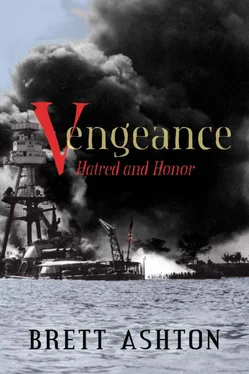So Sunday morning, December the seventh, 1941, began very much the same as any other day for the American fleet. But it could not have ended much more catastrophically different.
Those of us on the Oklahoma had been out to sea on a weekly basis for the last several months, drilling hard for the war that we knew was bound to come. Every week, we went out for practice and drilled, then back to Pearl for the weekend and the occasional inspections.
This weekend was the USS California’s and Oklahoma’s turn, and we were doing everything in preparation for a visit from Admiral Kimmel’s inspection crew, if not the Admiral himself. We were tied up alongside the Maryland in Battleship Row. The West Virginia and Vestal were aft of us, with the Tennessee and Arizona next to them. The Nevada was berthed aft of the Arizona , and California was forward of us, around the corner, on the other side of a fleet tanker called the Neosho . It seemed like almost every ship in the Pacific fleet was there except for the aircraft carriers and a few of their escorts.
At that time, I was the assistant gun boss on the battleship Oklahoma . The “ Okie ” we called her or the “ Old Okie ” sometimes, because she was now one of the oldest battleships in the fleet. My responsibility was to make sure the main battery guns and crew were ready and trained for anything at any time. So that morning, like the many mornings before when we were in port preparing for inspection (and would rather have been on liberty), I called a meeting with my staff over breakfast in the wardroom.
I liked to keep these meetings relatively informal, but on the early side before the tropical sun made the inside of the ship heat up too much. So we would usually break bread starting at 0630, have a little fun talk, and at about 0700 get down to the business of running a battleship and training its crew. This morning was no different from the many weeks and months preceding it.
I was the last to arrive at the breakfast meeting that morning and found the other officers of my crew already assembled and eating. There seemed to be a cheerful atmosphere about them as I arrived. And I had some idea what was coming.
“Congratulations, sir,” said the young ensign down at the end of the table “I hear it’s a boy.” Ensign Flaherty was one of the newest officers on board. He was twenty-two years old and certainly the “youngster” of the group. As such, he was also the most likely to be picked on by the rest of us. “Can we expect a bunch more little lieutenant commanders to be running around the ship with us?”
“It doesn’t matter how little my kids are, ensign, as long as you remember they will always outrank you,” I replied with a smile as I handed him one of the cigars I was carrying. “Now would you please be kind enough to get my coffee for me?” The ensign’s assignment during these meetings was to keep us supplied with coffee. Not that we really needed anybody to do so. The wardroom had plenty of mess clerks to do that for us, but it was expected of the junior officer to serve the coffee at such times. The real truth about the ensign was he showed truly exceptional capability as an officer. I’ve never seen anybody learn more quickly and rise to the needs that any occasion demanded better than him.
As Flaherty got up from the table on his assigned “mission,” the rest of the officers offered their congratulations on the birth of my second son and third child, James Patrick Williams, and likewise, accepted their cigars. Born at almost midnight the preceding Thursday, I had missed his birth. The demands of the navy at the time were too much, with gunnery practice that week. Career officers like me didn’t have the luxury of taking leave any time we felt we needed to. It’s just one of the sacrifices of military life that my wife, Susan, and I had learned to put up with.
The good thing was she and the kids were living right there in Hawaii. In fact, from where the Okie was berthed, when I was in my battle station on top of the forward main mast, I could see across the harbor to the hospital where she was. So as soon as the ship had pulled in on Friday afternoon, I was given the first liberty launch and took it over to see my new son. The XO and CO, being family men themselves, did all they could to help make my visit possible.
“It’s got to be a pain to have to miss your son’s birth like that, isn’t it?” said Lieutenant Alexander. Alexander was the division officer for turret number one. Lieutenants Bernelly, Feinstein, and Lewis, the division officers for the other turrets, were there, as well as several other gunnery department lieutenants and lieutenants, junior grade.
“Yes, somewhat, but I did get my first visit with them the day before yesterday. And let me tell you, for those of you who don’t have children, you are always happy to hold them for the first time. Even if you are a day or two late,” I said, digging into my scrambled eggs.
“But you have to look at the bigger picture. We are officers on a United States battleship preparing for war. Would you rather drill and be ready to defend our country for our wives and children or die on a floundering battleship, out of not being ready?”
“Do you really think war is coming to us?” said the ensign, returning with my coffee.
“Well,” I said, “take a good look at the world and try to deny the possibility.”
“What do you mean?” asked Bernelly.
“Well, what do you mean?” I said. “You can’t be thinking that this world, as it is, is a completely happy and peaceful place, can you?”
“No sir, but the fighting is going on halfway around the world with a huge ocean between us and them on both sides. It would be nearly impossible for either the Japanese or Germans to attack and invade the United States.”
“Well that may be true,” I replied, “but you know we have interests and bases around the world. And while the president says he will not send us to fight in a European war, we are providing weapons and supplies to England. That has got to piss Hitler off pretty bad, and he is still giving the Brits a rough go at it even with our help. The Germans seem to be unstoppable these days, having taken most of Europe, and England is currently standing alone. They even got enough balls to take on Russia at the same time.”
“Well, on the positive side, the Brits seem to have repelled the Germans for the time being. Plus I’d say the Krouts are almost unstoppable, especially if you ask the crew of the Bismarck, ” said Feinstein grinning. The intelligence reports of the sinking of the German battleship had been around for some time at that point.
“That’s true,” I said. “But that also shows, as an example, that battleships are sinkable. The Bismarck was new, with a well trained crew. The Brits reportedly got lucky with a torpedo and jammed the rudder, locking Bismarck into a big slow turn. And to add insult to injury, the old biplanes they used to launch the torpedoes are so slow and obsolete that the Germans couldn’t gear the anti-aircraft guns down enough to shoot back effectively. So what we have is a ship much more modern than the one we are sitting on being crippled by a lucky shot. Then being stranded in a big turn, finished off by a gang of smaller ships.”
“All the more reason to be ready all of the time,” Lewis added. “You never know what will happen in combat.”
I was glad to hear him say that. I had been trying for some time to get them to understand as a line officer on a ship, you have to be ready for anything.
“And that’s just the war in Europe,” I said. “The Germans and Japs are working together. The situation in the East has to reach a boiling point soon. They have been involved in their war in China and Mongolia for years now.”
Читать дальше












